It started with an advert. In 2002, a new British reality TV show was about to be launched. The prize? £100,000. The concept? Unclear. The wannabe contestants? People who thought of themselves as “characterful, resourceful and energetic”. All they knew was that they would have to give up their lives for a whole year. They didn’t even know what channel the secret show was going to be on, but that didn’t matter. Hundreds applied.
More like this:
– What Swedish reality TV can teach us
– 12 of the best TV shows this October
– The show that changed sex forever
Jane Marshall was one of them. She was 21, and living with her parents in Manchester at the time. The show seemed like an exciting way to escape her life, where she was doing ordinary things like working a nine-to-five job and spending her weekends clubbing with friends. There be a bigger and better reality out there for her. Maybe this was it? “I just knew it was going to be so exciting and challenging,” she tells BBC Culture.
Some auditionees were attracted by the money. Others, like Jane, were drawn to the flame of reality TV fame. The intense audition process was conducted by Nikita “Nik” Russian – a young and handsome TV guru whose production company was making the show. Thirty were chosen, including a presenter and camera person who would be part of the contest, while also filming and narrating the action. It promised to be like nothing we had seen before. The next big thing. “I thought we’d be given these amazing tasks,” Jane remembers. “That we’d have to think on our feet and work together to win challenges and points.”
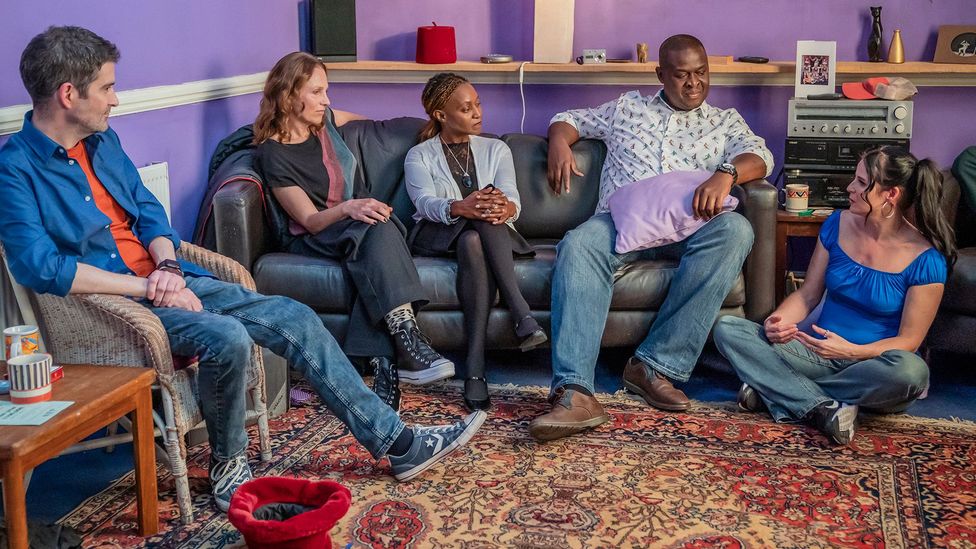
From left to right: John Comyn, Lucie Miller, Rosy Burnie, Daniel Pope and Jane Marshall (Credit: The Greatest Show Never Made, Prime Video)
The only problem? The show didn’t actually exist. “Nik” wasn’t a hot-shot TV boss. He was a man named Keith from Surrey, who had dropped out of university and now worked part-time in a bookshop. No TV channel had commissioned the show. The eponymous company, Nikita Russian Productions, didn’t actually exist either.
After gathering in central London and being told their mission – to work together to collectively earn £1m in a year and “beat money at its own game” – things quickly started to unravel. When the contestants realised they had nowhere to live, no jobs and no money, two of the three teams immediately bailed. The remaining team soon found themselves marooned in east London, crammed into a small flat and sleeping on the floor in sleeping bags. It was a far cry from the glamorous world of TV they thought was awaiting them. The audition process had seemed so slick and professional, but suddenly everything had fallen apart. They were devastated.
When the media caught wind of this story, the contestants were presented as “wannabes” on the news. The British comedian Harry Hill mocked them on his show, TV Burp. Why would anyone give up their life for a year to go on a show that didn’t exist? Later that year, the Channel 4 documentary The Great Reality TV Swindle was geared around a central question: How could they have been so silly? But there is more to this story.
Two decades on, The Greatest Show Never Made – a new three-part docu-series that launches on Prime Video today – re-tells the story of the one team of contestants who stayed in the game and the show’s mysterious creator. Through a mixture of archival self-filmed footage, interviews and colourful re-enacted scenes, we learn about how they were each using the show to chase their dreams.
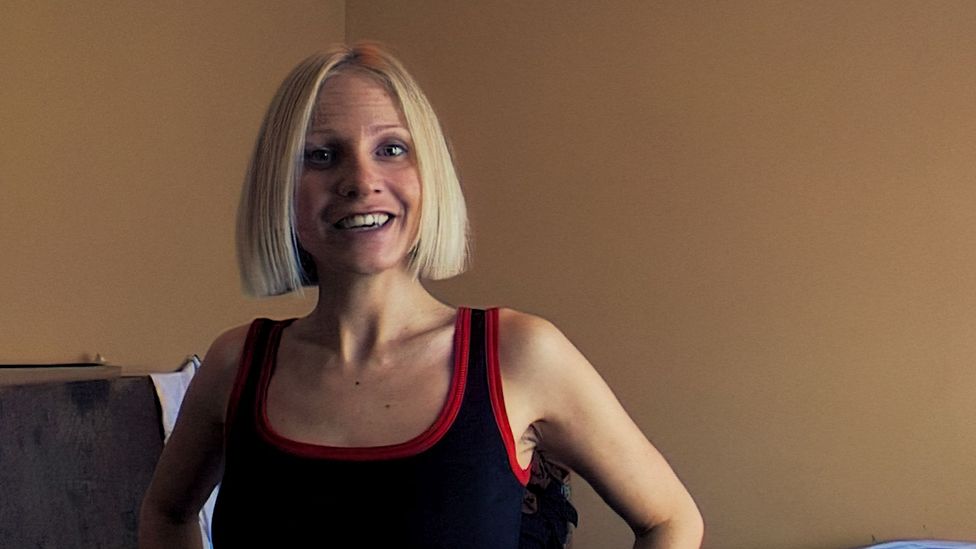
The new series includes archive footage from 2002 – this still shows Lucie Miller (Credit: The Greatest Show Never Made, Prime Video)
This bizarre story didn’t actually start with a misleading (to put it lightly) advert in the paper. It began several years earlier, when reality TV first became a cultural phenomenon. In the US, MTV’s The Real World – a show that filmed a group of young people living together in a loft – and survival competition show Survivor were drawing tens of millions of viewers at the turn of the millennium.
In the UK, the same shift was happening, albeit with different shows. ITV’s singing show Pop Idol was turning ordinary people into pop stars overnight. The first two series of Big Brother had driven the news agenda and become must-watch appointment TV. Big Brother started out as a social experiment, but beyond the walls of the house its impact was much greater.
Suddenly, regular people could be famous for being . A traditional talent – singing, acting, athleticism – was no longer a prerequisite for fame. Our notion of celebrity was forever changed, setting the wheels in motion for the norms of today, where Kim Kardashian is one of the world’s most famous people, and where more young people want to be an influencer or a YouTube star than a doctor.
Reality TV fame is now so normalised in our culture that we barely hear the phrase “famous for being famous” anymore. But in 2002, there was no blueprint of reality TV stardom. It was all brand new. “We had to explain that to the audience so that they didn’t think the contestants were stupid,” director Ashley Francis-Roy tells BBC Culture. “Of course, if you got offered this exciting opportunity you would go for it, wouldn’t you?”
Executive producer Emily Dalton agrees that the unknown element of reality TV is key to understanding this story today. “It might be tempting to judge these people through a modern filter, but at the time there was no other way for an ordinary person to become famous,” she tells BBC Culture. “And because reality TV was so new, that wasn’t something to be embarrassed about, like it perhaps is today. There weren’t the same negative connotations.”
At the time, the first two series of Big Brother had aired on Channel 4. The major controversies – like “Nasty” Nick Bateman being removed from the house – were relatively small-scale compared to how conflict-driven the show eventually became. The housemates reared chickens, and the emphasis was on “back to basics” living, not drunken arguments and celebrity.
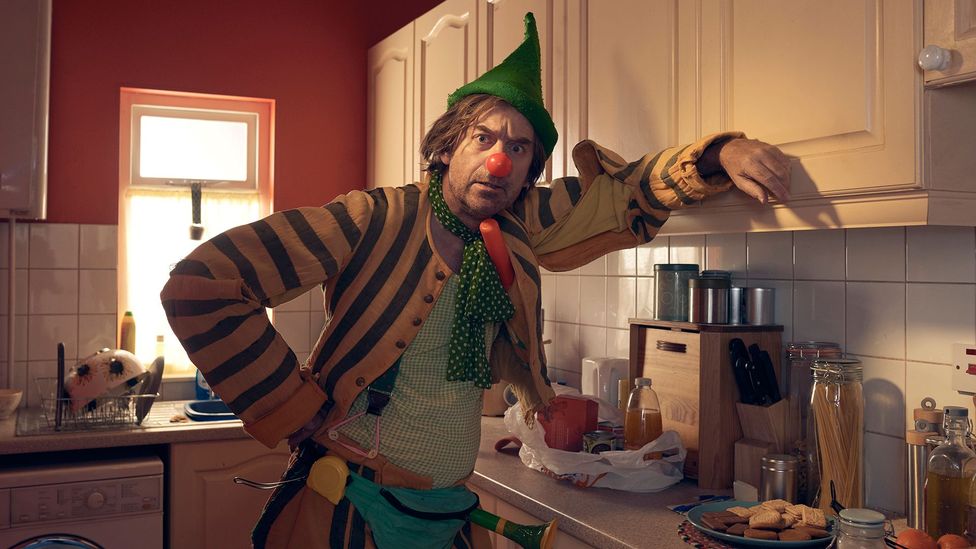
Tim Eagle is also a professional clown (Credit: The Greatest Show Never Made, Prime Video)
On The Greatest Show Never Made, the contestants are representative of this era. They are a handful of people who were picked because of their interesting backstories, not their likelihood to row with one another. Alongside Jane we meet Tim Eagle, a frustrated playwright and professional clown, who was chosen to document the show with his camera equipment. Rosy Burnie, a finance worker who had become bored in her job and wanted a new challenge. John Comyn and Daniel Pope, university graduates who were drawn to the financial prize. And Lucie Miller, a carpet salesperson from Birmingham who dreamed of being a TV presenter. She thought this show would help her break into the industry.
How were they persuaded to agree to participate in this docu-series, when they were so badly burned the first time? “We were very aware that they had been approached by other people throughout the years, and also portrayed in a negative light,” says Dalton. At the beginning, she wasn’t even allowed to tell them which platform was making the docu-series, which was potentially even more triggering.
It took months of informal conversations to get the contestants to agree to participate. And it took two years of back-and-forths with “Nikita Russian” – who now goes by the name N Quentin Woolf. “I didn’t even tell my husband that she [Dalton] had messaged me. I just ignored it,” Lucie tells BBC Culture. “I eventually did and he said, ‘What is the harm in having one conversation?'”. The tipping point, according to Francis-Roy, was convincing the group that they weren’t trying to make fools out of them, or portray anyone as the villain.
On the box
The documentary relies on the raw footage of the experiment, which had been kept in a shoebox by Tim all these years. He was the only camera person to keep filming. The irony of watching it is that, although the show was never made, it makes for captivating viewing today. It’s like an intersecting time-capsule of early-noughties culture – the hair, the clothes – and early reality TV, too.
There is a particularly interesting moment where, holed up in the East London flat, the group sits down to watch Big Brother together. They discuss their opinions on the housemates as they longingly watch them living the reality TV dream. It was like a show in itself. Part Big Brother, part precursor to Gogglebox. “I spent weeks watching the tapes over and over, and I got sucked into it,” Dalton says. “It felt like a soap opera unfolding in front of my eyes.”
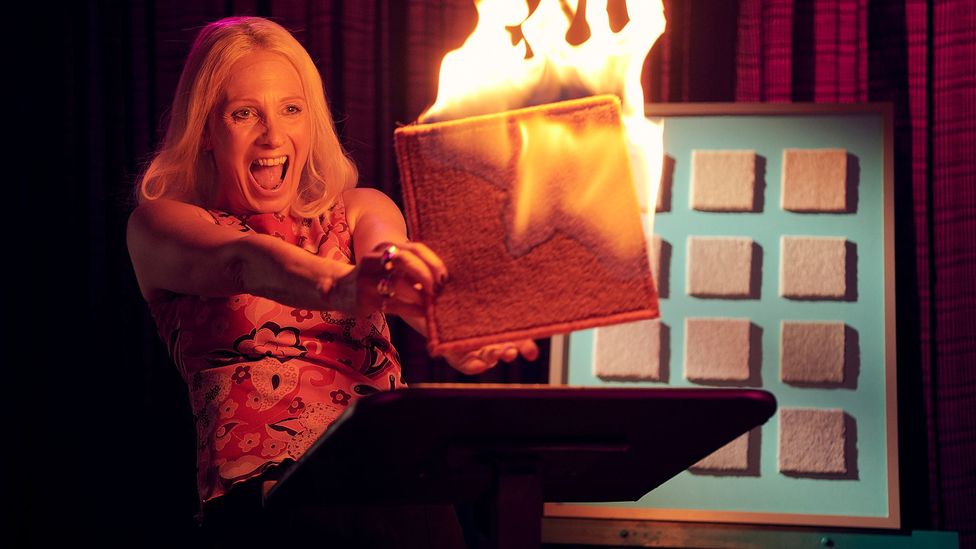
The contestants (including Lucie Miller, pictured) have recreated scenes for the new series (Credit: The Greatest Show Never Made, Prime Video)
Spliced together with the raw footage are interviews with the group as they revisit an exact replica of the London flat. The space was entirely recreated – right down to the food in the fridge, toiletries in the bathroom, posters on the walls, replica clothing and furniture. Jane still had all her original clothes from that time in her late father’s loft. We see the contestants dress up as their former selves in bright, saturated scenes inspired by Baz Luhrmann’s 1992 cult classic Strictly Ballroom.
The even greater irony is that the original idea by “Nik” – ordinary people giving up a year of their lives in a race to make £1m – is also a great idea for a TV show. It has elements of Survivor, or Channel 4’s Hunted, which satisfy the human urge to watch people struggling in challenging circumstances. The cash prize feels reminiscent of Who Wants to be a Millionaire? or The Million Pound Drop. “The plan was poorly executed,” says Daniel. “But the concept itself would still work.”
Devising revenge
The most interesting point of the story comes when everything starts to fall apart. Two of the teams bailed immediately, leaving only one group left in Tim’s flat. When Nik arrives at the door – professing to be equally devastated – a Lord of the Flies atmosphere takes over.
He is confronted by the angry contestants – who he misled into giving up jobs, homes and long-term relationships – and there is a brief moment where it feels like this could be about to become a true crime show. “I’m in the same situation, my dreams have been ruined too!” he insisted, before they locked him in a room and hatched a plan to use local news media to exact revenge on him by humiliating him on TV.
This footage, which included a self-filmed makeshift “diary room,” feels closer to a social experiment than even the original Big Brother ever did. Unbeknownst to the contestants, the greatest show was being made, it would just take two decades to reach its final form.
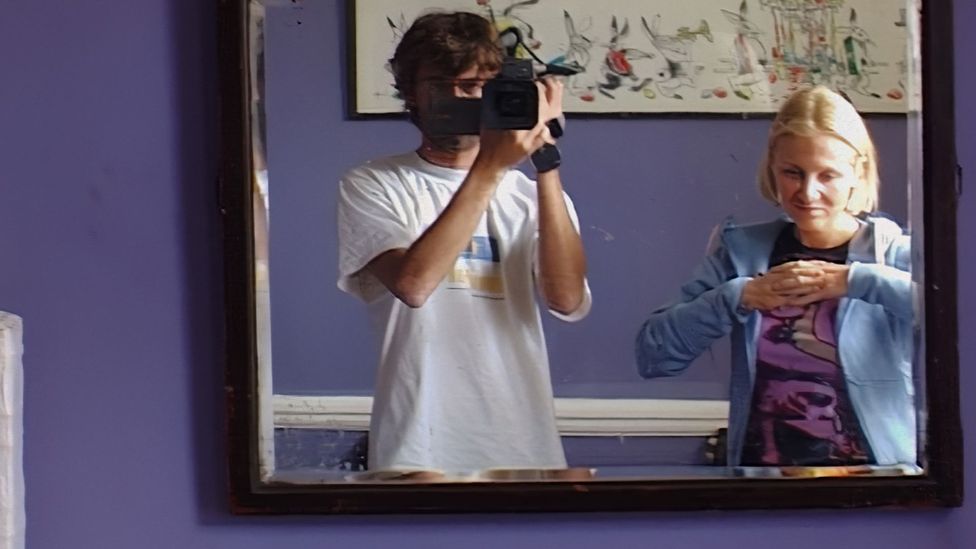
Tim Eagle and Lucie Miller, from 2002 (Credit: The Greatest Show Never Made, Prime Video)
Jane remembers how the unravelling of the show made her question what was real. “Even when we were back in the flat in Dalston, I wondered whether this was a challenge. Whether this was the game and whether there were other teams who would just walk away and give up,” she says. “I wondered if we were being watched.”
This might sound far-fetched, but it was where the reality genre was heading. In 2005, Channel 4 aired the reality show Space Cadets. The show was a hoax at the expense of its contestants, who were told they were being trained as astronauts at a Russian military base. The contestants were misled to believe that they were entering space – including a rocket flight in astronaut suits and looking down at what they thought was the Earth, but was actually just a green screen. In reality, the entire series was filmed in Suffolk, and the contestants did not leave Earth.
For Jane, facing her own reality was hard to accept, particularly after the media coverage of the situation gave her a taste of the TV stardom she craved. “When we left the show, I just didn’t want it to end,” she says, explaining why she couch surfed for months in London afterwards. “I didn’t want to go back to Manchester and admit that it was all a lie.”
The reality TV of this era was defined by this type of cruelty. By building people up and tearing them down (or just tearing them down). In preparation for making the documentary, Francis-Roy says that he watched a lot of noughties TV. “A lot of it is silly and joyful, but a lot of it was pretty nasty too,” he says. “They really used to go for people.” It’s a re-examination that is particularly timely now that Big Brother has returned to UK screens after being rebooted by ITV.
In that sense, The Greatest Show Never Made is a story about the present day, too. The contestants spoke about how being publicly shamed for being duped by Nik affected them long-term. Lucie remembers feeling like a failure, which she needed therapy to overcome. John says it made him more risk averse. “Nik” disappeared and changed his name, spending years blaming himself for ruining the contestants’ lives and trashing his own reputation.
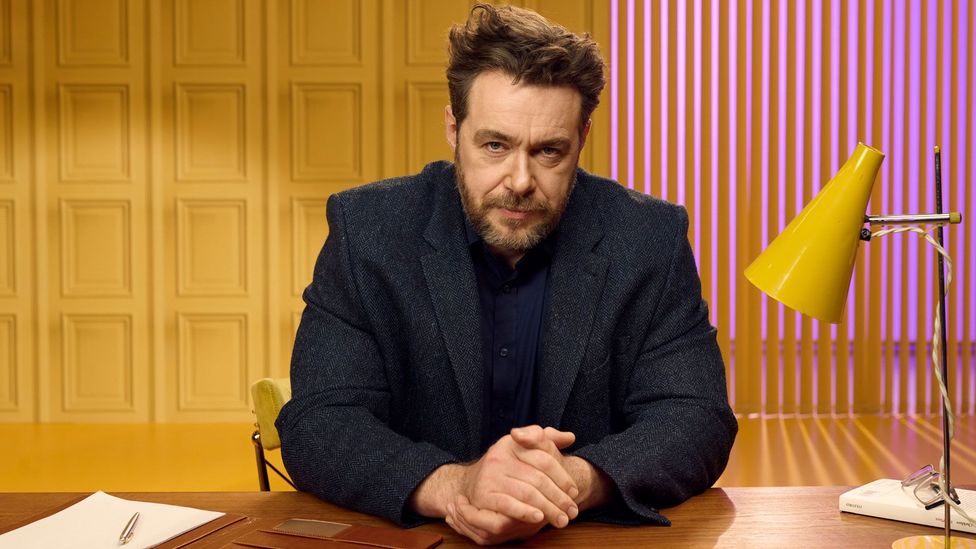
Nik appears in the new documentary series (Credit: Rory Mulvey)
Here, it is impossible not to be reminded of today’s news cycle, where viral stories often include an element of public shaming. Like Fyre Festival, where the internet celebrated influencers being publicly humiliated. Or Netflix’s The Tinder Swindler, where a common reaction was to insist the victims of romance scammer Simon Leviev should have known better. Daniel says the experience has taught him not to judge people until you’re in their shoes. “If you want something to be real, you’ll find ways to make it real and to dismiss any of the red flags.”
This story would be unlikely to happen today, where so much of our personal information is on the internet and our first instinct is to Google something if it doesn’t feel right. At the heart of the documentary is working out what really drove “Nik,” now N Quentin Woolf, to deceive people in an era where the average person was more trusting.
The documentary suggests he had a troubled childhood and genuinely hoped to make the show into a success. “He is a damaged person who’s had a tough life,” Francis-Roy says. “He’s now able to look back and it’s complicated for him. It’s still not easy for him to process.” Dalton says he had “everything except the contacts” to make the show a reality, while even the contestants think he had the makings of a great TV producer. Two decades on, he seems scarred by what happened and haunted by guilt. But it’s never fully clear whether he’s genuinely sorry for his actions, or merely sorry for his own downfall.
A second chance
The Greatest Show Never Made is a full-circle moment. For Nik, it’s about realising that he didn’t ruin the contestants’ lives, and that they don’t harbour any ill will against him. Jane is finally experiencing the TV fame she always aspired to. “It feels like all my plans in 2002 are finally happening right now,” she says. Lucie has now let go of the shame she harboured after being duped. “The word ‘wannabe’ used to make me cringe, but there’s nothing wrong with wanting to be someone or something,” she says. “I feel proud of it – and I didn’t say that before.” Similarly, the series has helped Tim to “completely reappraise” what happened.
The group were brought together by shared ambitions of fame and money, but they ended up finding their dreams in the ordinary. Lucie had twins at 45. Jane started working as a TV extra. Rosy moved to Spain and became an olive oil farmer. “Nik” published a book of poetry. Daniel and John are living contently in the corporate world. Tim, who still works as an entertainer, has done very well financially out of the footage he shot. “I’m just really glad that I carried on filming,” he says.
Even though it didn’t work out as planned, there is a hopefulness in these people having a dream and following it. They are forever bonded by what happened. But there is also a lingering sadness in how some of them didn’t think their lives were special enough without fame. How much they were willing to risk for it. How brutal the reality medium turned out to be. Not just for them, but for so many others – on the shows that were actually made.